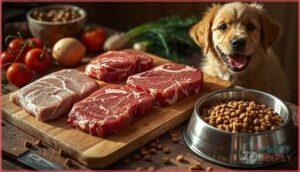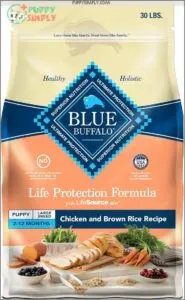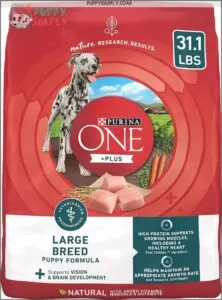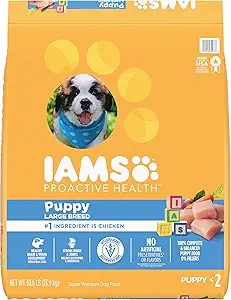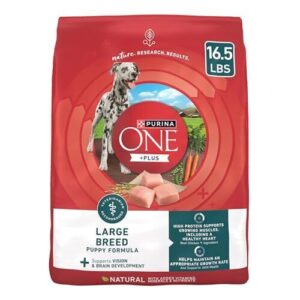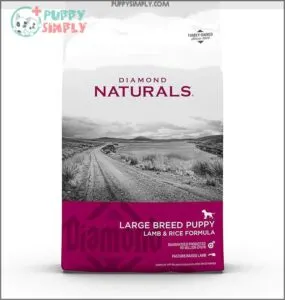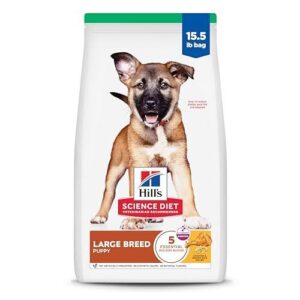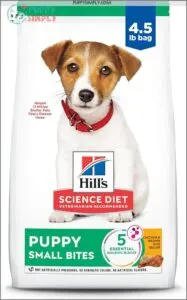This site is supported by our readers. We may earn a commission, at no cost to you, if you purchase through links.
Your Great Dane puppy doubles her weight every month for the first six months of life. That breakneck growth puts massive stress on developing bones and joints. Feed her like a smaller breed, and you’re setting the stage for hip dysplasia, elbow problems, and a lifetime of pain.
Large breed puppies need carefully balanced nutrition that promotes steady growth without pushing their skeletal system too fast. The right puppy food controls calcium and phosphorus levels while delivering quality protein for muscle development. Getting this balance wrong during the critical growth window can mean orthopedic issues that show up years later.
Table Of Contents
- Key Takeaways
- Large Breed Puppy Nutrition Needs
- Managing Healthy Growth Rates
- Key Ingredients in Large-Breed Puppy Foods
- How Large-Breed Puppy Foods Differ
- Choosing The Right Puppy Food Formula
- Top 8 Best Puppy Foods for Large Breeds
- 1. Blue Buffalo Puppy Chicken Brown Rice
- 2. Purina One Plus Large Breed Puppy
- 3. Purina Pro Plan Puppy Large Breed
- 4. Iams Puppy Large Breed Chicken Food
- 5. Purina ONE Large Breed Puppy Food
- 6. Diamond Naturals Large Breed Puppy Food
- 7. Hill’s Puppy Large Breed Chicken Rice
- 8. Hills Puppy Food Chicken Brown Rice
- Feeding Guidelines for Large-Breed Puppies
- Transitioning to Adult Dog Food
- Ensuring Long-Term Health Through Diet
- Frequently Asked Questions (FAQs)
- What should a large breed puppy eat?
- What is the #1 recommended puppy food?
- Do I really need large breed puppy food?
- What is considered a large breed?
- What is the ideal weight for large breed puppies?
- How often should I exercise my large breed puppy?
- What are the signs of DOD in large breed puppies?
- Can I give supplements to my large breed puppy?
- Can I make homemade food for large breed puppies?
- What treats are safe for large breed puppies?
- Conclusion
Key Takeaways
- Large breed puppies need food with controlled calcium (0.8–1.2% dry matter) and phosphorus levels to prevent developmental orthopedic diseases like hip dysplasia during their extended growth period of 14–24 months.
- Feeding high-quality protein sources (at least 22.5% crude protein) with moderate fat and calorie density prevents rapid weight gain that overloads immature joints and bones.
- Always verify the AAFCO statement confirms the formula is “for growth, including growth of large size dogs (70 lb or more as an adult)” rather than relying on front-of-bag marketing claims.
- Monitor your puppy’s body condition weekly and feed measured meals 3–4 times daily until six months, then transition to twice daily to maintain steady growth without free-choice overfeeding.
Large Breed Puppy Nutrition Needs
Raising a large breed puppy isn’t the same as raising a smaller dog. Their bodies grow at a different pace and need specific nutrients to develop strong bones and healthy joints without growing too fast.
Let’s look at what makes their nutritional needs unique and why getting it right matters so much.
Unique Growth Requirements of Large Breeds
Because large-breed puppies reach about 80% of adult body weight by 12 months—versus 6 to 8 months for small breeds—they face an extended growth period with unique skeletal needs. Your puppy gains significant weight on an immature frame, demanding careful calcium regulation and macronutrient needs.
Unlike smaller dogs, large-breed dogs can’t easily downregulate calcium absorption, making breed comparison essential when selecting their nutrition. If the website is experiencing problems, users may be redirected to alternative solutions.
Importance of Balanced Calcium and Phosphorus
Your puppy’s skeleton is built—or broken—by calcium and phosphorus balance. Large-breed dogs absorb calcium differently, so feeding within safe ranges of 0.8% to 1.2% on a dry matter basis prevents skeletal maturation problems. Keep the calcium-to-phosphorus ratio between 1.1:1 and 1.4:1 for proper bone development.
A balanced diet ensures optimal canine health. Excess calcium or a ratio above 2:1 can trigger developmental orthopedic disease and joint issues down the road.
Role of Protein, Fat, and Calories in Development
Growth rate depends on more than minerals alone. Your puppy needs at least 22.5% crude protein on a dry matter basis to build lean muscle, while fat provides concentrated energy.
Energy density matters—too many calories from high-fat diets fuel rapid weight gain, increasing orthopedic stress. Large breed puppy food balances macronutrient composition with controlled calories, supporting steady development without overloading growing joints through life-stage changes.
Managing Healthy Growth Rates
Getting your large breed puppy to grow at the right pace isn’t about rushing them to full size. It’s about steady, controlled development that protects their bones and joints while they’re still forming.
Let’s look at the key factors that help you manage healthy growth without putting your puppy at risk.
Risks of Rapid Growth in Large Breeds
When your large breed puppy gains weight too quickly, you’re basically asking their developing body to carry more than their immature skeleton can handle. Here’s what rapid growth can trigger:
- Joint stress from excessive weight loading on growth plates
- Reduced bone density and skeletal malformations
- Hip dysplasia affecting up to 66% of overfed puppies
- Cartilage damage that leads to lifelong orthopedic health issues in dogs
Large breed puppy nutrition controls growth rate, not just size.
Preventing Developmental Orthopedic Diseases (DOD)
To shield your puppy from DOD, you need precision in large breed puppy nutrition. Keep calcium between 0.8% and 1.2% on a dry matter basis—calcium excess above this range damages growing bones. Control energy intake by avoiding high-fat diets that fuel rapid weight gain. Giant breeds show heightened sensitivity to mineral imbalances, so monitor body condition weekly using this framework:
| Nutritional Factor | Target Range for DOD Prevention |
|---|---|
| Calcium | 0.8–1.2% dry matter |
| Phosphorus | 2.5–4.0 g per 1000 kcal |
| Calcium:Phosphorus Ratio | 1:1 to 1.8:1 |
| Energy Density | Moderate (avoid high-fat formulas) |
| Body Condition Score | 4–5 out of 9 (lean, ribs palpable) |
Large breed puppy food formulated within these limits promotes orthopedic health in dogs without compromising the role of protein in muscle development.
Monitoring and Adjusting Feeding Amounts
Once you know the target ranges, track your puppy’s progress using these five checkpoints every 2–4 weeks to fine-tune portions:
- Body Condition Score: Keep it at 4/9—ribs palpable without excess fat pressing.
- Growth Curve Tracking: Weekly weigh-ins against breed standards catch excessive gains early.
- Energy Intake Calculation: Recalculate calories as weight climbs; requirements drop per pound over time.
- Feeding Frequency: Shift from four meals to two as growth slows.
- Stool Quality: Loose stool signals overfeeding; reduce portions 10%.
Key Ingredients in Large-Breed Puppy Foods
The ingredients in your large breed puppy’s food matter just as much as the nutritional percentages on the label. You want to look for specific protein sources and whole food ingredients that support steady growth without overdoing it.
Here are the key components that make a large breed puppy food truly work for your growing dog.
High-quality Protein Sources (chicken, Beef, Lamb)
When you choose a large breed puppy food, look for chicken, beef, or lamb listed first on the ingredient panel. These high-quality animal protein sources deliver essential amino acids your puppy needs for muscle development and to meet growth requirements.
Chicken offers excellent protein digestibility around 80%, while beef and lamb work well for puppies with protein sensitivities, ensuring your large breed dog’s nutritional needs are met.
Nutrient-dense Whole Foods and Added Supplements
Beyond named proteins, nutrient-dense whole foods like brown rice, spinach, and carrots boost antioxidant synergy and gut microbiome support in large breed puppy food. Organ meats such as chicken gizzard increase the bioavailability of iron and zinc.
Many formulas add omega-3 fatty acids from fish oil for brain development, plus vitamin E and probiotics to strengthen immune function during growth while balancing calcium and phosphorus for puppy nutrition and health.
Glucosamine and Chondroitin for Joint Support
Large breed puppy food often includes glucosamine and chondroitin to promote cartilage protection and joint health during rapid growth. These compounds support long-term joint function, especially in breeds prone to hip dysplasia.
While preventive strategies matter, dosage guidelines recommend around 1,000 mg per day for most large breed puppies. Safety concerns arise only with accidental over-supplementation, so store joint supplements securely as part of responsible large breed dog care.
How Large-Breed Puppy Foods Differ
Large-breed puppy foods aren’t just regular puppy food in a bigger bag. They’re specifically formulated with different nutritional levels to support slower, steadier growth.
Here’s what sets them apart from standard puppy formulas.
Lower Maximum Calcium and Phosphorus Levels
Standard puppy foods can pack in too much calcium and phosphorus, which spells trouble for your large breed puppy’s developing bones. That’s why dedicated large breed formulas cap calcium at 1.8% on a dry matter basis—well below the 4.5 g per 1,000 kcal ceiling set for regular puppy diets.
These formulation targets help you avoid skeletal disease and keep phosphorus interactions balanced throughout growth.
Controlled Calcium-to-phosphorus Ratio
That calcium ceiling matters most when paired with the right amount of phosphorus. You want a desirable Ca:P ratio between 1.1:1 and 1.4:1 in your large breed puppy food to minimize DOD risk.
This tight mineral density control fosters a steady growth rate without overwhelming your pup’s skeleton. Raw diets often miss this balance, so stick with formulas that coordinate calcium, phosphorus, and vitamin D for large breed dogs.
Reduced Fat and Calorie Content
Lower fat and calorie density work hand in hand with those mineral controls to slow your puppy’s growth rate. Large breed puppy food generally delivers 350 to 400 kcal per 100 g dry matter—well below standard puppy formulas—to prevent orthopedic risk tied to rapid weight gain.
Keep fat percentage under 12% dry matter to avoid energy excess that can trigger developmental bone issues. A lean body condition protects growing joints from extra load. These formulation differences directly support weight management for dogs who need steady, controlled growth rather than the sprint that smaller breeds can handle.
Watch for these energy density red flags in any formula:
- High fat content pushing calories above 400 kcal per 100 g
- Free-choice feeding instructions that ignore breed-specific dietary needs
- Labels that lump all puppies together without growth rate distinctions
- Missing AAFCO statements for large breed dogs specifically
Choosing The Right Puppy Food Formula
You can’t just grab any bag of puppy food off the shelf and call it a day. Large breed puppies need formulas that meet specific nutritional standards to grow at a healthy pace.
Here’s what to look for when you’re reading those labels.
Verifying AAFCO Nutritional Adequacy Statements
How can you be certain a puppy food is right for your large breed? Check the AAFCO statement on the label. It should say “formulated for growth, including growth of large size dogs (70 lb or more as an adult).” This wording confirms the formula meets stricter calcium limits.
Veterinary recommendations emphasize label verification over front-of-bag marketing claims to guarantee safe nutrition for large breed puppies.
Minimum Protein Requirements on a Dry Matter Basis
Beyond the AAFCO statement, your large breed puppy food must meet protein minimums on a dry matter basis. AAFCO guidelines require at least 22.5% crude protein for growth, expressed as 56.3 grams per 1,000 kilocalories. NRC guidance and FEDIAF guidelines align closely.
This protein density encourages lean muscle development without excess calories that harm orthopedic health. You’ll want formulas balancing protein needs against controlled energy intake.
Grain-free Vs. Grain-inclusive Options
After reports linked grain-free diets to DCM concerns in large breeds, veterinary guidance shifted toward grain-inclusive options with proven track records. Many grain-free formulas contain high legume content—sometimes over 40% of carbohydrate sources—which raises questions about nutritional profiles despite owner perceptions of grain avoidance benefits.
When choosing puppy food for large breed puppies, consider:
- Manufacturer reputation: Select brands employing board-certified veterinary nutritionists
- AAFCO compliance: Verify formulas meet growth standards through feeding trials
- Ingredient balance: Prefer traditional grains like rice over pulse-heavy recipes
- Protein quality: Confirm taurine and methionine supplementation in grain-free formulas
Top 8 Best Puppy Foods for Large Breeds
Now that you know what to look for in a large breed puppy food, let’s review eight formulas that meet these important nutritional standards.
Each option on this list provides the controlled calcium levels and balanced nutrition your growing puppy needs. These foods come from manufacturers with strong quality control and formulations designed specifically for large breed development.
1. Blue Buffalo Puppy Chicken Brown Rice
Blue Buffalo Life Protection Formula Large Breed Puppy Chicken and Brown Rice offers real deboned chicken as the first ingredient, delivering high-quality protein for your growing pup. The macronutrient profile provides around 400 calories per cup, supporting healthy development without encouraging rapid weight gain.
You’ll find DHA and ARA for brain and eye health, plus LifeSource Bits packed with antioxidants. The formula includes natural sources of glucosamine and chondroitin for joint support.
Check the AAFCO compliance statement on your bag to confirm it’s appropriate for large breeds over 70 pounds.
Best For: Owners of large breed puppies (50+ pounds at adulthood) looking for a natural formula with real chicken, DHA for brain development, and controlled calcium levels to support steady growth without overtaxing developing joints.
- Real deboned chicken as the first ingredient provides high-quality protein for muscle development, with added DHA and ARA supporting cognitive and eye health during critical growth phases.
- Includes LifeSource Bits with antioxidants for immune support, plus natural sources of glucosamine and chondroitin from chicken meal to help protect growing joints.
- No chicken by-product meals, corn, wheat, or soy, and uses whole grains like brown rice and oatmeal for steady energy without artificial preservatives.
- Some owners report the kibble size doesn’t always match their puppy’s needs—either too small for larger mouths or too large for younger pups still learning to chew.
- May cause digestive upset or diarrhea in dogs with individual sensitivities, even though it’s marketed for sensitive stomachs.
- Priced higher than many mainstream puppy foods, and you’ll need to verify the AAFCO statement on your specific bag confirms it’s formulated for large breeds over 70 pounds.
2. Purina One Plus Large Breed Puppy
Purina ONE Plus Large Breed Puppy lists real chicken as the first ingredient, delivering 28% protein and 13% fat on an as-fed basis—strong macronutrients for puppy growth and development. The ingredient analysis shows 1.1% calcium and 0.9% phosphorus, maintaining the controlled ratio large breeds need.
You’ll find 400 ppm glucosamine for joint support, plus DHA at 0.05% for brain and vision development. AAFCO compliance confirms it’s tested for large breed puppy nutrition.
Feeding guidelines range from 1 to 11 cups daily depending on age and projected adult weight, helping you manage healthy growth rates without overfeeding.
Best For: Owners of large breed puppies (70+ lbs as adults) who want a high-protein formula with controlled calcium levels and joint support to manage healthy growth rates.
- Real chicken as the #1 ingredient delivers 28% protein to build strong muscles during rapid growth phases
- Contains 400 ppm glucosamine and controlled calcium-to-phosphorus ratio (1.1% to 0.9%) to support joint health and appropriate skeletal development
- Includes DHA for brain and vision development, plus four antioxidant sources to strengthen the immune system
- Some puppies may experience digestive issues or refuse to eat it, requiring a gradual transition period
- Mixed customer feedback on tolerability, particularly for dogs with sensitive stomachs or food allergies
- Large 31-pound bag represents a bigger upfront investment, which may be a concern if your puppy doesn’t take to the food
3. Purina Pro Plan Puppy Large Breed
Real chicken leads the ingredient analysis in Purina Pro Plan Puppy Large Breed, delivering 30% protein and 18% fat that fuel healthy puppy growth and development. You’ll get 1.1% calcium with 0.9% phosphorus—meeting the tight ratio large breed puppy food demands.
Nutritional benefits include 500 ppm glucosamine for joints and 0.1% DHA for brain function.
Customer reviews highlight breed suitability for puppies expected to hit 50+ pounds.
Feeding guidelines adjust portions by weight and age, supporting controlled nutrition without overfeeding risks.
Best For: Large breed puppy owners who want controlled nutrition with joint support and brain-boosting DHA for dogs expected to reach 50+ pounds at maturity.
- High-quality protein from real chicken as the first ingredient, with 30% protein and 18% fat to support healthy growth
- Includes 500 ppm glucosamine for developing joints and 0.1% DHA for brain and vision development
- Meets AAFCO standards with a carefully balanced 1.2:1 calcium-to-phosphorus ratio designed specifically for large breed puppies
- Some customer reports mention digestive issues like diarrhea in certain dogs
- A few dogs may refuse to eat the food despite the chicken and rice formula
- Higher price point compared to some competing large breed puppy foods
4. Iams Puppy Large Breed Chicken Food
Iams Puppy Large Breed Chicken Food provides 28% protein from real chicken and controlled minerals—1.2% calcium and 0.9% phosphorus—to support safe skeletal growth without overloading developing bones.
The formula includes DHA from fish oil for brain development and 350 mg/kg glucosamine for joint support. Nutritional analysis confirms 14% fat for steady energy.
Feeding recommendations adjust portions by weight to prevent rapid growth that strains large breeds.
Customer feedback shows mixed results on puppy stool quality, though most report good acceptance and healthy development with this established brand reputation formula.
Best For: Owners of large breed puppies who want a vet-recommended formula with controlled calcium and phosphorus to support healthy bone growth and joint development.
- High protein content (28%) from real chicken helps build strong muscles during the critical growth phase
- Controlled mineral levels (1.2% calcium, 0.9% phosphorus) are specifically balanced to prevent skeletal issues common in large breeds
- Includes 350 mg/kg glucosamine and DHA from fish oil to support joints and brain development
- Some puppies experience digestive issues like diarrhea, with mixed reports on stool quality
- Contains chicken by-product meal and grain fillers (corn, sorghum) which some owners prefer to avoid
- Packaging design has small, hard-to-read fonts that make checking ingredients and feeding guidelines difficult
5. Purina ONE Large Breed Puppy Food
Your large breed puppy needs tight mineral control during growth, and this formula delivers 1.1% calcium with 0.8–0.9% phosphorus for safe skeletal development.
Purina ONE Large Breed Puppy Food meets AAFCO statements through feeding trials for large breeds, providing 28% protein from real chicken to fuel puppy development.
You’ll find 400 ppm glucosamine for joint support and DHA for brain function.
Brand reputation holds strong, though some owners report digestive concerns during diet changes.
Best For: Large breed puppy owners who want controlled calcium and phosphorus levels to support safe bone growth while providing high protein and joint-supporting ingredients like glucosamine and DHA.
- Contains 28% protein from real chicken as the first ingredient, plus 400 ppm glucosamine to support growing muscles and developing joints in large breed puppies
- Meets strict mineral balance guidelines with 1.1% calcium and 0.8–0.9% phosphorus, backed by AAFCO feeding trials specifically for large breeds expected to reach 70 pounds
- Includes DHA from fish oil for brain and vision development, with no artificial flavors or preservatives
- Some dogs experience digestive issues like diarrhea during transition, requiring a gradual switch to avoid tummy upset
- The 16.5-pound bag represents a larger upfront investment, which may be a consideration for owners testing their puppy’s tolerance to the formula
- Purina products have faced regulatory scrutiny, with the FDA receiving about 1,300 adverse event reports across various Purina foods between late 2023 and early 2024
6. Diamond Naturals Large Breed Puppy Food
Another solid choice comes from Diamond Naturals Large Breed Puppy Food with lamb and rice, offering 27% protein and 1.2–1.5% calcium for controlled puppy growth. This formula carries AAFCO compliance for all life stages, including large breeds.
You’ll appreciate functional ingredients like DHA at 0.05% for brain development, plus probiotics and L-carnitine. Feeding guidelines adjust from 5.67 cups daily at early growth to 2.75 cups as your puppy matures.
The brand’s recall history shows no incidents since 2013, though earlier salmonella events warrant mention.
Best For: Large-breed puppy owners seeking a lamb-based formula with controlled calcium levels and proven track record, especially if their dog has chicken sensitivities.
- AAFCO-compliant with targeted nutrition—27% protein and carefully balanced 1.2–1.5% calcium to support healthy bone growth without overloading developing joints
- Includes DHA for brain and vision development, plus probiotics and L-carnitine to support digestion, immunity, and ideal body condition
- Clean safety record with no recalls since 2013 and good value at $54.99 for a 40 lb bag
- Some puppies experience digestive upset like diarrhea or gas, especially without a gradual food transition
- Past salmonella recalls (2012) and aflatoxin contamination (2005) raise questions about historical quality control, though recent years show improvement
- Not all dogs enjoy the taste, and individual puppies with specific sensitivities may still react to ingredients despite the lamb base
7. Hill’s Puppy Large Breed Chicken Rice
Hill’s Science Diet Puppy Large Breed Chicken Rice delivers 22% protein and tightly controlled calcium for safe skeletal development in your growing pup. The ingredient analysis shows chicken and brown rice as primary components, plus DHA from fish oil at specified levels for brain support. Vitamin content includes 425 IU/kg of vitamin E.
You’ll feed around 7 cups daily during peak growth, decreasing the amount as your puppy matures.
Recall history includes a 2019 vitamin D issue affecting some canned lines, though no recent alerts target this dry large breed puppy food formula.
Best For: Large breed puppy owners who want a veterinarian-recommended formula with controlled calcium levels to support safe bone growth and DHA for brain development.
- Formulated specifically for large breeds with optimal calcium to prevent too-rapid skeletal growth and reduce orthopedic risk
- Contains DHA from fish oil at measured levels (plus 425 IU/kg vitamin E) to support healthy brain and eye development
- Provides 22% protein from quality sources like chicken and chicken meal to fuel growing muscles without excessive calories
- Some owners report the kibble size is too large for their puppies to comfortably chew
- Mixed customer experiences with digestive issues including diarrhea and gas during feeding
- Priced at $47.99 for 15.5 lb, which some customers consider expensive compared to other large breed puppy foods
8. Hills Puppy Food Chicken Brown Rice
Your puppy deserves precision nutrition during those critical months. Hills Science Diet Large Breed Puppy Food with Chicken & Brown Rice offers 24–29% protein alongside calcium held near 1.0% for controlled bone formation.
The ingredient analysis features chicken, whole grain oats, and DHA from fish oil to support brain development.
You’ll spend around $19.99 per bag—mid-range pricing for this breed suitability and veterinary backing.
Feeding recommendations suggest starting with 1⅛ cups daily for young pups, adjusting upward as your large breed grows steadily toward adulthood.
Best For: Owners of large-breed puppies who want controlled calcium levels to support steady bone growth without the risk of developmental orthopedic problems.
- Formulated with optimal calcium-to-phosphorus ratios (around 1.2–1.3:1) to prevent overly rapid skeletal development in large breeds.
- Includes DHA from fish oil for brain and eye development, plus antioxidants like vitamins C and E to support the immune system.
- Uses chicken and chicken meal as primary protein sources with no chicken by-product meal, meeting AAFCO standards for large-breed puppy growth.
- Contains common allergens like chicken, wheat, and soy, which may trigger sensitivities in some puppies.
- Mid-range price point of $19.99 per bag may be higher than budget-friendly alternatives.
- Ingredients sourced globally under U.S. manufacturing, which may concern owners seeking fully domestic supply chains.
Feeding Guidelines for Large-Breed Puppies
Feeding your large-breed puppy the right amount at the right times makes all the difference in how they grow. You can’t just fill the bowl and hope for the best—these pups need a structured approach that changes as they develop.
Here’s what you need to know about portions, timing, and avoiding the pitfalls of overfeeding.
Recommended Feeding Frequency by Age
Your puppy’s stomach isn’t built for all-day grazing. During weaning schedules from 8 to 12 weeks, offer 3 to 4 meals daily—this bolsters glycogen reserves and helps with house-training. From 3 to 6 months through late puppy development stages, maintain 3 meals to prevent gastric distension. After 6 months, most large breed puppies do well on 2 meals with proper meal spacing for healthy growth.
| Age Range | Meals Per Day | Key Benefits |
|---|---|---|
| 8–12 weeks | 3–4 meals | Bolsters glycogen reserves, aids house-training |
| 3–6 months | 3 meals | Prevents gastric distension during intensive growth |
| 6–12+ months | 2–3 meals | Maintains steady energy, bolsters puppy development stages |
Calculating and Adjusting Portion Sizes
How do you nail portion sizes without second-guessing every meal? Start with puppy feeding guidelines on your large breed puppy food label, then monitor body condition weekly. Growth curves reveal whether calories match your pup’s needs—adjust portions by 5–10% if ribs vanish or jut out.
Weight monitoring and portion recalibration every few weeks keep canine diet and puppy care on track, bolstering weight management through each stage.
Avoiding Overfeeding and Free-choice Feeding
Because large breed puppies will overeat when given unlimited access, you must skip free-choice feeding entirely. Portion control through measured meals—usually three to four times daily until six months—prevents excessive puppy growth and developmental orthopedic diseases.
Calculate total calorie intake from all sources, monitor body condition weekly, and adjust portions promptly when weight management shows your large breed puppy food isn’t matching growth monitoring goals set by puppy feeding guidelines.
Transitioning to Adult Dog Food
Your large breed puppy won’t stay on puppy food forever. Switching to adult food at the right time protects their bones and joints from unnecessary stress.
Here’s what you need to know to make that change safely and smoothly.
Signs Your Large Breed Puppy is Ready
When should you make the switch? Your large breed puppy is ready for adult food when their growth rate slows and weight plateaus near their expected adult size—between 14 and 24 months in most cases.
You’ll notice energy decline and reduced portion needs as skeletal maturity approaches. Large breed dogs reach this point later than smaller puppies, so vet confirmation helps verify proper puppy development timing.
Gradual Transition Steps to Adult Food
A slow handoff protects your puppy’s digestion. Follow a 5-to-10-day adjustment timeline by mixing ratios starting at 80% puppy food and 20% adult food, then shifting to 60–40, 50–50, and finally 100% adult.
Monitor stool quality daily and maintain portion control to match your dog’s caloric needs. If diarrhea appears, pause and slow the pace to support stable canine nutrition throughout puppy development.
Importance of Veterinary Consultation
Your vet brings specialized dietary assessment tools to the table. They can verify AAFCO standards, fine-tune mineral management for orthopedic prevention, and tailor veterinary advice for pet owners based on your large breed puppy’s health markers.
Veterinary care and veterinary medicine expertise guarantee owner adherence to safe adjustment protocols. Professional puppy care and development guidance protects your growing dog when commercial labels leave you guessing.
Ensuring Long-Term Health Through Diet
The food you choose for your large breed puppy doesn’t just affect growth during the first year. It sets the foundation for your dog’s entire life.
Let’s look at how proper nutrition now protects against future health problems and keeps your dog active for years to come.
Preventing Obesity and Orthopedic Issues
Ever noticed how carrying extra groceries strains your arms? For large breed puppies, extra weight means more stress on joints and bones, too. Here’s how to support orthopedic health and safe puppy development:
- Use calorie restriction to manage growth and lower joint load.
- Pick formulated diets designed for large breed dogs’ skeletal development.
- Monitor body condition to prevent obesity and orthopedic issues.
Impact of Proper Nutrition on Adult Health
Your puppy’s diet today shapes their tomorrow. Research shows that large breed puppy food fostering controlled growth can add nearly two years to your dog’s life.
Proper nutrition during puppyhood can extend your large breed dog’s life by nearly two years
Proper nutrition strengthens joint health, prevents disease, and aids gut microbiome development in large breed dogs.
Dogs receiving balanced nutrition from puppyhood show better immune function, fewer chronic conditions, and improved mobility well into their senior years.
Regular Growth Monitoring and Dietary Adjustments
Tracking your large breed puppy’s growth isn’t a one-and-done task. Weekly weight checks during the first year help you catch problems early. Your vet will use BCS evaluation to determine if caloric intake needs adjustment.
This veterinary oversight helps prevent overweight puppies, which face higher risks of joint disease. Regular monitoring means you can tweak nutrition as your puppy grows, keeping development on track.
Frequently Asked Questions (FAQs)
What should a large breed puppy eat?
Think of building a house: you need strong materials in the right amounts.
Large breed puppies need food formulated specifically for their size—balanced protein, controlled calcium, and moderate calories to support steady, healthy growth without stressing developing joints.
What is the #1 recommended puppy food?
No single puppy food ranks universally # Veterinarian recommendations highlight Hill’s Science Diet and Orijen as top choices.
You should verify AAFCO standards, ingredient quality, and nutritional adequacy to match your large breed puppy’s individual needs.
Do I really need large breed puppy food?
Yes, for breeds topping 70 pounds as adults, large breed puppy food limits calcium oversupplementation and energy density matters to prevent growth formula risks.
Veterinarian recommendations emphasize AAFCO label verification for large breed dogs’ proper growth and nutrition.
What is considered a large breed?
Large breed dogs generally reach 70 pounds or more at adult weight, according to AAFCO standards. Many veterinarians classify them as 50 to 90 pounds, with giant breeds exceeding 100 pounds at maturity.
What is the ideal weight for large breed puppies?
Your large breed puppy’s ideal weight depends on breed and age. Most reach 60% of adult weight by six months, hitting 85% around twelve months.
Monitor body condition score regularly to guarantee healthy growth.
How often should I exercise my large breed puppy?
Your large breed puppy benefits from several short walks daily, usually 15 to 30 minutes per session. Avoid high-impact activities while growth plates remain open, usually until 10 to 14 months.
What are the signs of DOD in large breed puppies?
If your puppy suddenly limps after a normal play session, it might not be an accident. DOD early signs include shifting lameness, joint swelling, and reluctance to move—especially in fast-growing large breed puppies.
Can I give supplements to my large breed puppy?
You shouldn’t add nutritional supplements to AAFCO-compliant large breed puppy food.
Veterinary advice warns against calcium or vitamin supplementation because it increases skeletal abnormality risks and developmental orthopedic disease in growing puppies.
Can I make homemade food for large breed puppies?
You can, but 95% of homemade recipes lack essential nutrients. Work with a board-certified veterinary nutritionist to avoid calcium imbalance risks and developmental orthopedic diseases in your growing puppy.
What treats are safe for large breed puppies?
Treats are rewards, but too many calories disrupt nutrition. Safe options include low-fat training treats or kibble pieces. Avoid xylitol, chocolate, grapes, raisins, onions, and garlic—all toxic to puppies.
Conclusion
What’s the point of choosing a large breed puppy if you won’t give her the foundation to thrive? Your dog’s adult health hinges on decisions you make during her explosive growth phase.
The best puppy food for large breeds isn’t just about filling her bowl—it’s about protecting joints, building strong bones, and preventing years of pain. Feed smart now, and watch your gentle giant flourish for a lifetime.
- https://todaysveterinarynurse.com/nutrition/nutrition-for-the-large-breed-puppy/
- https://www.reddit.com/r/puppy101/comments/g7v5lw/calcium_in_puppy_food_large_breed/
- https://lyka.com.au/blog/puppies-developmental-nutrition
- https://www.dogfoodadvisor.com/calcium-content-analyzer/
- https://vcahospitals.com/know-your-pet/nutritional-considerations-for-large-and-giant-breed-dogs



